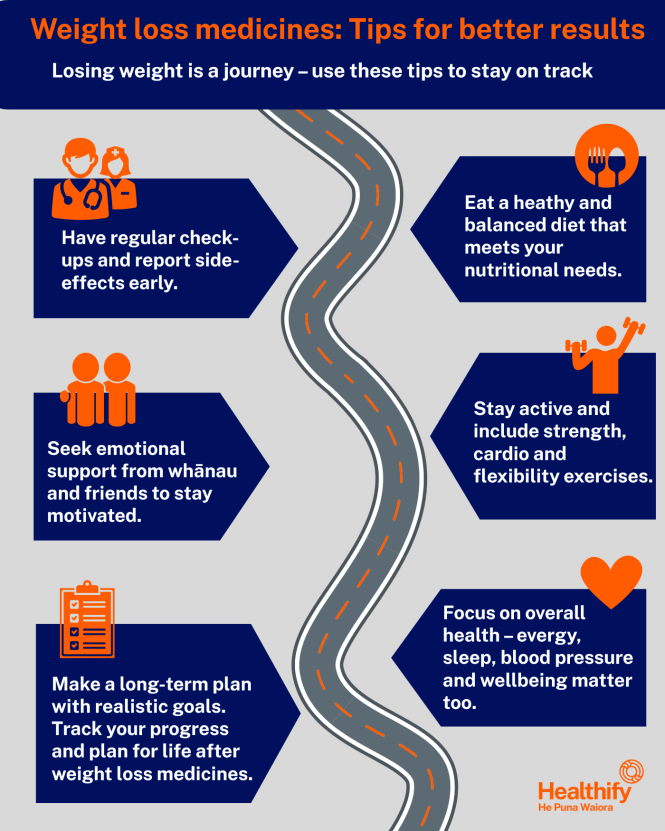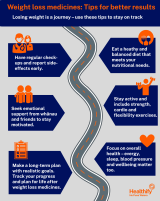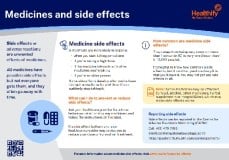You can now add Healthify as a preferred source on Google. Click here to see us when you search Google.
Contrave
Key points about Contrave
- Contrave® is used as a weight-loss treatment for people with a body mass index (BMI) of 30 or more or 27 to 29 with weight-related health problems.
- It's used together with a healthy diet and regular exercise.
- Contrave consists of 2 medicines – naltrexone and bupropion.
- Find out how to take it safely and possible side effects.

Contrave® is a weight-loss treatment that's used, together with a healthy, balanced diet and regular exercise, as part of an overall weight-loss plan. Contrave has 2 medicines in each tablet – naltrexone and bupropion. When taken together, they help to reduce hunger and control food cravings. This can lead to eating fewer calories and losing weight.
Weight loss medicines are used for weight loss when lifestyle changes such as healthy diet and exercise haven't been successful on their own. A routine of healthy eating and regular exercise can provide lasting weight loss. However, for some people this isn't enough and weight loss medicines may help.
Contrave is available only on prescription
To be prescribed Contrave, you must meet certain criteria depending on your body mass index (BMI) and other health conditions you may have. BMI is calculated using your height and weight. Learn more about BMI.
- Contrave is used in adults with a BMI of 30 or more (obese).
- It is also used in adults with a BMI of 27 to 29 (overweight) if they have at least one weight-related health problem such as type 2 diabetes, high blood pressure, high cholesterol or obstructive sleep apnoea.
Note: Contrave is not funded in New Zealand, which means you'll have to pay for it yourself.

Image credit: Healthify He Puna Waiora NZ
If you have taken opioids in the last 10 days
Don't start taking this medicine (and tell your healthcare provider) if you've used opioids within the last 10 days, as it could cause severe withdrawal symptoms. Examples of opioids are codeine, dihydrocodeine, tramadol, morphine, oxycodone, methadone, fentanyl and pethidine.
Before having surgery or a medical procedure
Tell your healthcare provider you're taking Contrave before you have surgery or a medical procedure. Opioid medicines are often used as pain relief afterwards. You will need to stop taking Contrave for at least 3 days before starting opioid treatment.
Tests and monitoring
Contrave may cause increased blood pressure or a faster heart rate for some people. Your healthcare provider will check your blood pressure and heart rate both before starting Contrave and during treatment.
If you have the following health conditions
If you have the following, please discuss your options with your healthcare provider before taking Contrave as it may not be suitable for you:
- Epilepsy or seizures.
- Bipolar disorder or mood disorders.
- High blood pressure.
- Alcohol or drug withdrawal.
- Pregnancy.
- A history of eating disorders such as bulimia or anorexia nervosa.
In Aotearoa New Zealand Contrave comes as a tablet.
The usual starting dose is 1 tablet in the morning during the first week. The dose is slowly increased over a 4-week period. Always take Contrave exactly as your healthcare provider has told you. The pharmacy label on your medicine will tell you how much to take, how often to take it and any special instructions. Here is some guidance.
- Week 1: 1 tablet in the morning.
- Week 2: 1 tablet in the morning AND 1 tablet in the evening.
- Week 3: 2 tablets in the morning AND and 1 tablet in the evening.
- Week 4 onwards: 2 tablets in the morning AND 2 tablets in the evening.
- Timing: Take your dose regularly at the same time each day. If you have trouble sleeping when taking this medicine, it may help to take the evening dose earlier in the day, but at least 8 hours after the morning dose.
- Swallow the tablets whole with a glass of water: Don't crush, chew, or cut tablets.
- Food: It's best to take Contrave with food, but don't take it with a high-fat meal as it may increase your risk of side effects.
- Alcohol: Avoid alcohol while you're taking Contrave, especially when you first start treatment. Alcohol can increase your risk of side effects such as dizziness and drowsiness.
- Missed dose: If you forget to take your dose, take it as soon as you remember. But, if it's nearly time for your next dose, just take the next dose at the right time. Don't take double the dose.
Here are some things to know when you're taking Contrave. Other things may be important as well, so ask your healthcare provider what you should know about.
- Have regular checkups with your healthcare team: Having regular checkups every few weeks to months with your healthcare team is important when you’re on Contrave. These visits help to monitor how well the medicine is working and to keep an eye out for any side effects or concerns. Treatment shouldn't be continued for more than 16 weeks if you've not lost more than 5% of your initial body weight.
- Alcohol: Avoid alcohol while you're taking Contrave, especially when you first start treatment. Alcohol can increase your risk of side effects such as dizziness and drowsiness.
- Driving: Contrave can affect your concentration. Don't drive or use tools or machinery until you know how this medicine affects you.
- Taking other medicines: Contrave interacts with other medicines. Tell your healthcare provider or pharmacist about all medicines you're taking including over the counter medicines, herbal and complementary medicines or recreational drugs.
- Ongoing support when taking weight loss medicines: Managing obesity is about losing weight and focusing on building healthier habits, managing related health issues, improving quality of life, and supporting emotional wellbeing. Having a personalised plan tailored to your needs can be a helpful tool to support you on your weight loss journey. Learn more about ongoing support when taking weight loss medicines.
Like all medicines, Contrave can cause side effects, although not everyone gets them. If you're concerned about any symptoms you think might be related to your medicine, talk to your healthcare provider. The following information offers some guidance but doesn't include all possible side effects.
Common side effects
Tell your healthcare provider if they bother you.
- Nausea (feeling sick) or vomiting (being sick).
- Headache.
- Dry mouth, changes in the way food tastes or loss of taste.
- Tummy pain, constipation or diarrhoea.
- Tinnitus (hearing noise or ringing in your ears).
- Itchy skin, hives.
- Tremor.
- Feeling dizzy: Don’t drink alcohol. Be careful when driving or using tools until you feel better.
- Trouble sleeping: It may help to take the evening dose earlier in the day, but at least 8 hours after the morning dose.
Tell your healthcare provider immediately or phone Healthline free on 0800 611 116 if these occur
- Seizures.
- Mood changes, anxiety, depression, or worsening depression, low mood, aggressive tendencies, thoughts or talk of suicide and self-harm.
- Signs of problems with your liver such as yellowing of your skin or eyes, dark urine or pain in your abdomen.
Phone 111 for an ambulance or go to your nearest accident and emergency (A&E) clinic if these occur
- Signs of an allergic reaction such as itchy skin, and rash, swollen lips or tongue, problems breathing, like a tight chest or shortness of breath.
Read more about medicines and side effects and reporting a reaction you think might be a side effect.
The following links have more information on Contrave:
Contrave(external link) Medsafe Consumer Information Sheet, NZ
Brochures
Weight loss medicines: Tips for better results [PNG, 363 KB] Healthify He Puna Waiora, NZ, 2026
Healthy eating, active living(external link) HealthEd, NZ, 2020
Behind the hype – weight loss diets(external link) Health Ed and Health Promotion Agency, NZ, 2019
References
- Naltrexone + bupropion hydrochloride(external link) NZ Formulary
- Spotlight on Contrave (naltrexone + bupropion)(external link) Medsafe Prescriber Update, NZ, June 2025
- Weight loss – the options and the evidence(external link) BPAC, NZ, 2022
Brochures

Weight loss medicines: Tips for better results
Healthify He Puna Waiora, NZ, 2026

Medicines and side effects
Healthify He Puna Waiora, NZ, 2024

Health Quality and Safety Commission, NZ, 2019 English, te reo Māori
Credits: Sandra Ponen, Pharmacist, Healthify He Puna Waiora. Healthify is brought to you by Health Navigator Charitable Trust.
Reviewed by: Angela Lambie, Pharmacist, Auckland
Last reviewed:
Page last updated:





